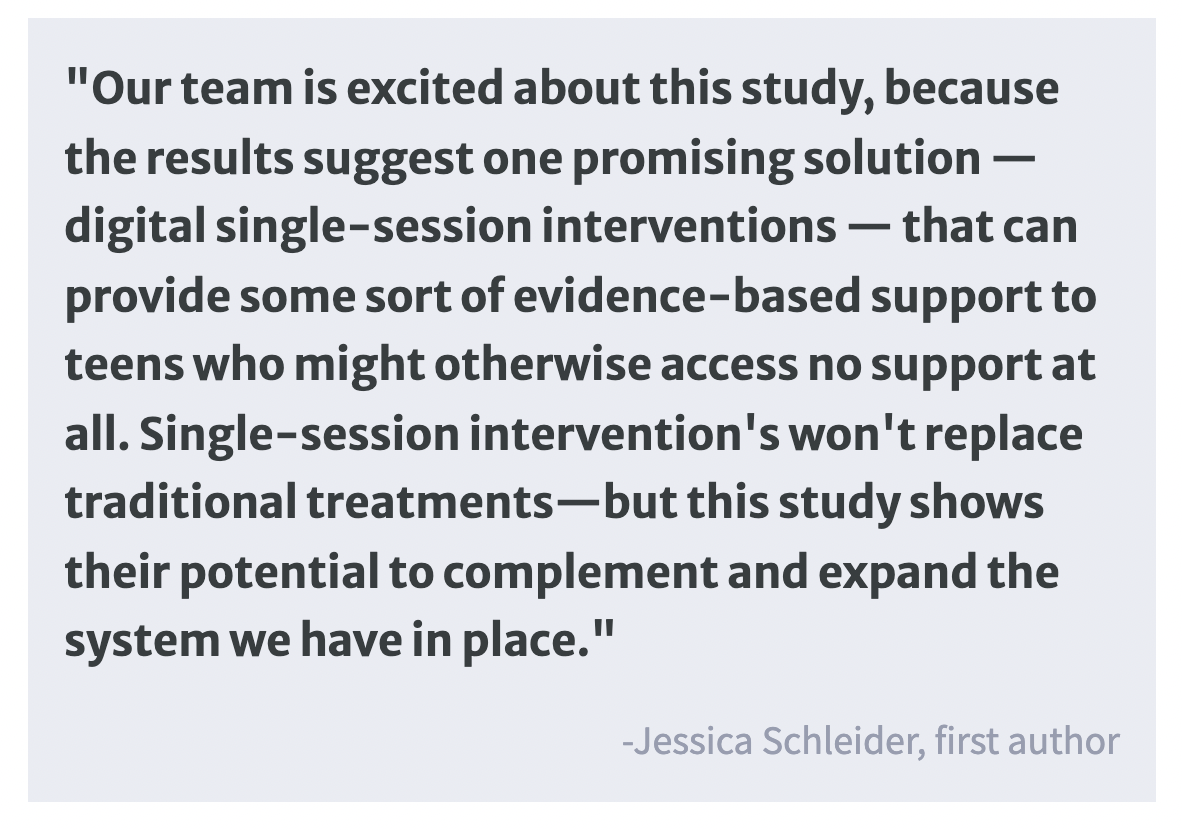Online Single-Session Interventions Can Help Depressed Teenagers
Post by D. Chloe Chung
The takeaway
Accessible, online single-session interventions that teach coping skills can effectively improve symptoms related to depression in teenagers, especially during the COVID-19 pandemic with heightened teen depression.
What's the science?
Rates of depression among teenagers soared during the COVID-19 pandemic as they faced social isolation due to school closure and financial difficulties. While teen depression is the major health risk for young people, more than half of depressed teenagers lacked access to professional help even before the pandemic. As many teenagers find it challenging to seek mental healthcare services due to stigma from family or financial reasons, it is important to create effective and accessible platforms to help those in need. Recently in Nature Human Behaviour, Schleider and colleagues showed that accessible, online single-session interventions that teach coping skills can reduce depression in teenagers.
How did they do it?
The authors used Instagram advertisements to recruit a diverse group of teenagers (13-16 years old) in the United States who were experiencing depressive symptoms. Recruited teenagers were informed that they would be rewarded up to $20 by participating in the minimal-risk, free, confidential online psychology study. Since depressed teenagers often feel uncomfortable telling their guardians about their mental health problems, the study was approved to waive consent from parents for participation. A total of 2,452 eligible teenagers who completed the baseline survey were randomly assigned with one of three web-based, single-session interventions designed by the authors. The first active intervention (“growth mindset”) teaches the participants that symptoms and personal traits can change. The second active intervention (“behavioral activation”) teaches participants how to adapt behaviors to experience positive sensations such as happiness and accomplishment. The third intervention (“supportive therapy”), that encourages sharing emotions with others, acts a placebo as it does not teach specific coping skills. Each of the self-guided interventions included peer narratives and writing activities taking 20-30 minutes to complete. The participants were asked to complete the follow-up survey three months after the interventions. Both pre- and post-intervention surveys assessed a range of symptoms including depression, anxiety, COVID-19-related trauma, hopelessness, eating behaviors, and perceived sense of agency.
What did they find?
The authors compared the depressive symptoms measured during the baseline survey and the follow-up survey. From this analysis, they found that both “growth mindset” and “behavioral activation” interventions substantially decreased depressive symptoms compared to the placebo session. The degree of reduction in depressive symptoms was similar between groups of each active intervention. Both active interventions also improved other aspects in depressed teenagers. Specifically, three months after these interventions, participants reported decreased hopelessness, decreased restrictive eating, and increased sense of agency. However, when it comes to reducing trauma-related to COVID-19 and anxiety, only the “growth mindset” intervention and not the “behavioral activation” intervention was effective.
What's the impact?
This study has shown that even a single online intervention session can help depressed teenagers who may otherwise have difficulties in seeking accessible professional help. Study results were promising as the access to mental healthcare services is even more limited during the global pandemic. Since the reduction in depressive and other symptoms by these active interventions was modest, depressed teenagers should be provided with more intense and long-term help for sustainable care. Still, this non-traditional, highly accessible mental healthcare service can support teenagers who might otherwise have trouble getting appropriate help.


